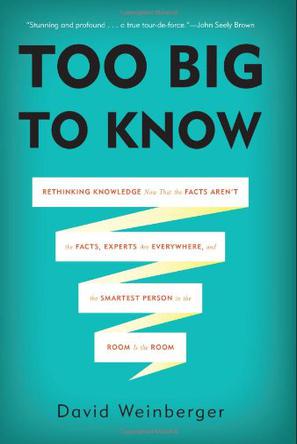作者:
David Weinberger
副标题: Rethinking Knowledge Now That the Facts Aren't the Facts, Experts Are Everywhere, and the Smartest Person in the Room Is the Room
In this title, a leading philosopher of the internet explains how knowledge and expertise can still work - and even grow stronger - in an age when the internet has made topics simply Too Big to Know. Knowing used to be so straightforward. If we wanted to know something we looked it up, asked an expert, gathered the facts, weighted the possibilities, and honed in on the best answer ourselves. But, ironically, with the advent of the internet and the limitless information it contains, we're less sure about what we know, who knows what, or even what it means to know at all. Knowledge, it would appear, is in crisis. And yet, while its very foundations seem to be collapsing, human knowledge has grown in previously unimaginable ways, and in inconceivable directions, in the Internet age. We fact-check the news media more closely and publicly than ever before. Science is advancing at an unheard of pace thanks to new collaborative techniques and new ways to find patterns in vast amounts of data. Businesses are finding expertise in every corner of their organization, and across the broad swath of their stakeholders. We are in a crisis of knowledge at the same time that we are in an epochal exaltation of knowledge. In "Too Big to Know", Internet philosopher David Weinberger explains that, rather than a systemic collapse, the Internet era represents a fundamental change in the methods we have for understanding the world around us. Weinberger argues that our notions of expertise - what it is, how it works, and how it is cultivated - are out of date, rooted in our pre-networked culture and assumptions. For thousands of years, we've relied upon a reductionist process of filtering, winnowing, and otherwise reducing the complex world to something more manageable in order to understand it. Back then, an expert was someone who had mastered a particular, well-defined domain. Now, we live in an age when topics are blown apart and stitched together by momentary interests, diverse points of view, and connections ranging from the insightful to the perverse. Weinberger shows that, while the limits of our own paper-based tools have historically prevented us from achieving our full capacity of knowledge, we can now be as smart as our new medium allows - but we will be smart differently. For the new medium is a network, and that network changes our oldest, most basic strategy of knowing. Rather than knowing-by-reducing, we are now knowing-by-including. Indeed, knowledge now is best thought of not as the content of books or even of minds, but as the way the network works. Knowledge will never be the same - not for science, not for business, not for education, not for government, not for any of us. As Weinberger makes clear, to make sense of this new system of knowledge, we need - and smart companies are developing - networks that are themselves experts. Full of rich and sometimes surprising examples from history, politics, business, philosophy, and science, "Too Big to Know" describes how the very foundations of knowledge have been overturned, and what this revolution means for our future.
戴维•温伯格是国际畅销书《市场就是谈话》的作者之一和《小块松散结构》的作者。他是一名哲学博士,现任哈佛法学院伯克曼互联网与社会研究中心的研究员。温伯格常年为《连线》、《纽约时报》和《哈佛商业评论》等出版机构供稿,还经常担任美国国家公共电台的《时事纵览》节目的特约评论员。作为营销顾问,他曾为多家《财富》500强公司、顶尖传媒企业和诸多创意独具的新创公司服务,还曾经担任霍华德•迪安(Howard Dean)总统选举团队的高级互联网顾问。目前,他居住在波士顿。
 Too Big to Knowtxt,chm,pdf,epub,mobi下载
Too Big to Knowtxt,chm,pdf,epub,mobi下载 connor爱狼者2024-06-10 08:59:47
connor爱狼者2024-06-10 08:59:47 Story°2024-06-21 01:32:34
Story°2024-06-21 01:32:34 caprice°2024-06-15 15:31:43
caprice°2024-06-15 15:31:43 James替代者,替补者2024-06-17 08:07:36
James替代者,替补者2024-06-17 08:07:36 bowen波文2024-06-13 11:56:16
bowen波文2024-06-13 11:56:16 freedom自由2024-06-24 08:26:35
freedom自由2024-06-24 08:26:35 Theskyoflove2024-06-03 19:03:17
Theskyoflove2024-06-03 19:03:17 厌世re-cwert2024-06-01 08:32:16
厌世re-cwert2024-06-01 08:32:16 Logan小洞,凹地2024-06-19 00:10:08
Logan小洞,凹地2024-06-19 00:10:08 Younotloveme2024-06-29 19:06:14
Younotloveme2024-06-29 19:06:14
